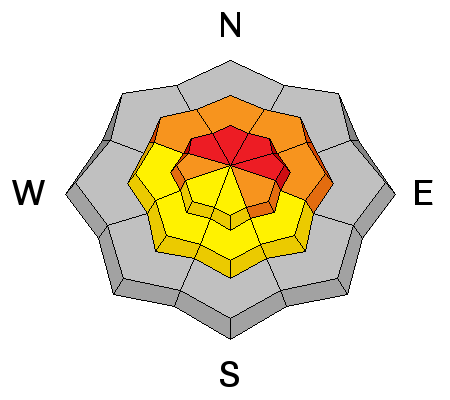| Please join us at the 23rd annual Black Diamond Fall Fundraiser Party Thursday Sept 15. Tickets are on sale now here, at the Black Diamond store & at REI. Special bonus raffle for online ticket purchasers! |  |

| Please join us at the 23rd annual Black Diamond Fall Fundraiser Party Thursday Sept 15. Tickets are on sale now here, at the Black Diamond store & at REI. Special bonus raffle for online ticket purchasers! |  |
| Advisory: Logan Area Mountains | Issued by Toby Weed for Monday - December 21, 2015 - 6:36am |
|---|
 |
avalanche watch THE FOREST SERVICE UTAH AVALANCHE CENTER IN SALT LAKE CITY HAS CONTINUED THE BACKCOUNTRY AVALANCHE WATCH. * TIMING...MONDAY...THEN TRANSITIONING TO AN AVALANCHE WARNING THIS AFTERNOON. * AFFECTED AREA...ALL THE MOUNTAINS OF NORTHERN UTAH AND SOUTHEASTERN IDAHO, TO INCLUDE THE WASATCH RANGE, THE BEAR RIVER RANGE, THE WESTERN UINTAS AND THE MANTI-SKYLINE PLATEAU. * AVALANCHE DANGER...EXPECTED HEAVY SNOW AND STRONG WIND WILL PUSH THE DANGER TO HIGH AND PERHAPS EXTREME OVER THE NEXT SEVERAL DAYS. * IMPACTS...BY LATER MONDAY INTO TUESDAY, LARGE AND DANGEROUS NATURAL AND HUMAN TRIGGERED AVALANCHES WILL BE LIKELY. AVOID BEING IN STEEP TERRAIN OR BENEATH AVALANCHE RUNOUT ZONES. BACKCOUNTRY TRAVELERS SHOULD CONSULT WWW.UTAHAVALANCHECENTER.ORG OR CALL 1-888-999-4019 FOR MORE DETAILED INFORMATION. THIS WATCH DOES NOT APPLY TO SKI AREAS WHERE AVALANCHE HAZARD REDUCTION MEASURES ARE PERFORMED. |
 |
current conditions The Tony Grove Snotel at 8400' reports 7 inches of new snow overnight, containing .6" of water. The station reports 19 degrees this morning and 40 inches of total snow containing 74% of average water content for the date. Southwest winds appear to be increasing this morning, with the CSI Logan Peak weather station recording current average wind speeds around 15 mph, and it's 12 degrees at 9700'. Many avalanche paths in the Logan Zone may be hanging in a delicate balance and some may very well reach their tipping point today. Very weak faceted snow is widespread at mid and upper elevations in the Bear River Range. Accumulating snow and intensifying west winds are in the process of creating a heavier slab layer on top of the loose faceted snow, and avalanche conditions are becoming very dangerous in the backcountry around Logan. The avalanche danger at upper elevations will likely rise to HIGH with today's heavy snow and increasing west wind, and we strongly recommend that people should avoid backcountry travel in avalanche terrain.
|
 |
recent activity Saturday (12-19-15): A very experienced local rider who was separated from his companion is lucky to be alive after triggering a good sized avalanche, being caught and carried through thick trees, and then being mostly buried and trapped in the debris. Sunday (12-20-15): A skier reported remote triggering a large hard slab avalanche yesterday afternoon on a drifted north facing slope high on the south rim of Logan Canyon off the ridge deviding Logan Canyon from Dry Canyon..... Go to his Report
A sizable remote triggered avalanche from Sunday in the backcountry above Logan Canyon. (Syrstad, 12-20-15) ***To view our updated list of backcountry observations and avalanche activity from around Utah, go to our observations page
|
| type | aspect/elevation | characteristics |
|---|


|


|

LIKELIHOOD
 LIKELY
UNLIKELY
SIZE
 LARGE
SMALL
TREND
 INCREASING DANGER
SAME
DECREASING DANGER
|
|
description
A slab layer consiting of settled snow from last week and drifted fresh snow from yesterday, overnight, and today is overloading existing widespread very weak faceted snow, and we are entering a very dangerous and scary period in the backcountry Dangerous persistent slab avalanches are likely in drifted terrain at upper and mid-elevations, and periods of heavy snowfall and intensifying west wind today will cause the danger to increase and become more widespread. Natural activity is most likely during periods of particularly heavy snowfall and/or extensive drifting, and dangerous and destructive humman triggered avalanches are likely on many drifted slopes, which have just or are about to reach the tipping point.
***Pay close attention to signs of unstable snow like recent avalanches, whumpfing, and shooting cracks, and be willing to reevaluate your plans. In these conditions you might trigger avalanches remotely, from a distance or worse, from below!
|
| type | aspect/elevation | characteristics |
|---|


|


|

LIKELIHOOD
 LIKELY
UNLIKELY
SIZE
 LARGE
SMALL
TREND
 INCREASING DANGER
SAME
DECREASING DANGER
|
|
description
Deeper hard slab avalanches, also failing on weak faceted snow in the basal layers of the snowpack are possible in drifted upper elevation terrain. Avoid all backcountry travel in or under steep drifted slopes today.
|
 |
weather The National Weather Service in Salt Lake City has issued a Winter Storm Warning for the mountains of SE Idaho and Northern Utah. We can expect light snowfall this morning, becoming heavy in the afternoon, intensifying and strong west winds, with wind speeds averaging in the thirties and gusts near 50 mph expected in the afternoon, and fairly mild temperatures (29 degrees expected as 8500' high.) Snowfall and sustained west wind will continue tonight, and the current forecast calls for 10 to 18 inches of accumulation by tomorrow morning. Significant snowfall and windy conditions are expected to continue in the mountains through Wednesday. |
| general announcements Please submit snow and avalanche observations from your ventures in the backcountry HERE. You can call us at 801-524-5304 or email HERE, or include #utavy in your Instagram or Tweet us @UAClogan. To report avalanche activity in the Logan Area or to contact the local avalanche forecaster call me, Toby, at 435-757-7578. I'll update this advisory throughout the season on Monday, Wednesday, Friday, and Saturday mornings by about 7:30 This advisory is produced by the U.S.D.A. Forest Service, which is solely responsible for its content. It describes only general avalanche conditions and local variations always exist. |
Advisory Hotline: (888) 999-4019 | Contact Information